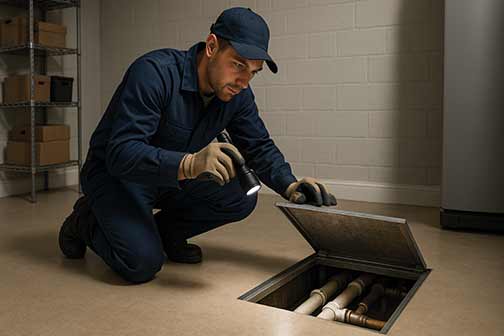
Imagine a basement packed with essential systems, from plumbing pipes and electrical wiring to heating units, all hidden beneath the surface.
Now, picture trying to inspect or repair any of them without a proper access point. No clear entry, just flooring or improvised covers that take tools, time, and sometimes a bit of force to break through.
Routine maintenance can become complicated, time-consuming, and risky without floor access panels.
Contractors have to lift tiles, cut into flooring, or work around awkward barriers to reach shutoff valves or camera inspect a sewer line. In emergencies, such delays could mean significant damage.
Floor access panels offer safer, quicker, and cleaner access to the systems that keep buildings running.
Why Choose Floor Access Panels for Basement Utility Checks?
Adding a floor access panel to a basement offers many safety and practical benefits. Here’s what makes them a smart solution:
Providing Easy Access for Routine Plumbing and Utility Checks
Basement systems need regular inspections, whether checking water lines, shutoff valves, or utility meters. Floor access panels make these checks faster and more convenient. Instead of moving heavy items or pulling up floorboards, you simply open the panel and get to work.
Easy access encourages regular maintenance, helping catch problems early and avoid expensive repairs down the line. Regular maintenance also allows systems to function at their best for as long as possible.
Reducing the Risk of Tripping and Accidents
Temporary or improvised access points, like loose boards or exposed gaps, can lead to accidents. Floor access panels lie flat with the surrounding floor, creating a level surface that’s safer to walk on.
Most modern designs have minimalistic hardware—like hidden hinges and drop handles—that stay flush with the floor, ensuring nothing protrudes above the ground.
This is especially helpful in tight or dim basement areas, where tripping hazards can be harder to see during work.
Keeping Basement Floors Clean and Organized
Open or uncovered access points often collect dust, dirt, or moisture, making basements feel messy. A floor access panel covers the area completely, keeping the space clean and dry when not in use.
As a result, the basement becomes easier to maintain, especially if used as a finished living space or storage area.
Withstanding Heavy Foot Traffic With Strong and Durable Materials
Most floor access panels are built to last, whether the basement is used regularly or only occasionally. These hatches are made from tough materials like steel or reinforced aluminum that hold up under heavy use.
Depending on the use case, they also come tested to withstand various live loads, ranging from 150 to over 600 pounds per square foot. As such, they won’t crack or shift easily under heavy weight, making them suitable for homes and commercial buildings.
Allowing Quick Emergency Access to Hidden Systems
Some system failures, like a burst pipe emergency or an electrical issue, make quick access crucial. A floor access panel lets contractors or property managers quickly reach valves, cables, or drains.
Quick access can help limit damage and speed up emergency repairs. It can also help lower downtime, especially in commercial spaces, ensuring businesses keep running.
Minimizing Noise Coming From the Basement
Some basements can be noisy, especially in older structures where the utilities are harder at work. Many floor access panels are built with noise-reducing features like rubber seals or cushioned lids, which help keep things quieter in basements.
This is very useful in homes or multi-unit buildings where low noise levels are often important.
Matching Various Basement Floor Finishes
Manufacturers today don’t just make panels that function well; they also provide invisible access solutions. This means that most modern designs can now match different flooring styles.
Many have recessed panels that allow you to inlay tile, wood, or concrete into the panel lid to blend in with the surrounding floor.
With such panels, property owners no longer have to choose between looks and function, especially in finished basement spaces.
Preventing Damage From Forced Access
Without a proper panel, reaching basement systems might involve pulling up flooring or cutting into concrete, which can cause lasting damage.
Floor access panels solve this problem with their secure latches, which allow for repeated access without harming the floor. Over time, this helps reduce repair costs and keeps the basement in better condition.
Choosing Floor Panels for Basement Access
When selecting a floor access panel for a basement, contractors and renovators should consider a few key features:
- Load Rating: Make sure the panel can handle the weight of people or equipment that may pass over it.
- Material: Use rust-resistant materials like stainless steel or aluminum since basement areas can be prone to dampness or moisture.
- Sealing: In moisture-prone areas, choose panels with a watertight seal to prevent leaks or buildup.
- Security: Consider panels that lock to prevent unauthorized access.
- Appearance: Select a panel that matches the flooring for a cleaner look in finished basements.
Every basement serves a different purpose, from providing storage to acting as a living space. So choosing a floor panel that suits the space’s specific needs and uses is important.
Conclusion
Floor access panels are more than a design feature. They’re a practical investment that improves safety, simplifies inspections, and protects important systems. For contractors and renovation professionals, they offer a clean and secure way to access utilities while keeping the space looking great.
The benefits are clear: from preventing trips to allowing faster emergency repairs, floor access panels are a safer and smarter solution for checking basement systems.
Whether planning a remodel or working on a new build, including a floor access panel in the basement design can make future maintenance easier and improve project quality.

